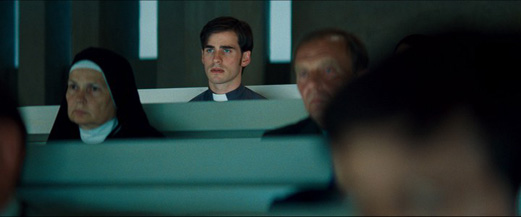|
|
Book vs. Movie: The RiteBy Russ BickerstaffFebruary 2, 2011
Baglio’s exorcists come across as a combination of a few different quite mundane professions. On the one hand, they come across as physicians. Evidently, the practice of the exorcist is a lot less glamorous than Max Von Sydow made it look in 1973. Exorcisms evidently take numerous sessions over the course of several years. People aren’t bedridden with demonic afflictions so much as they are inconvenienced by them. In this light, the possession ends up coming across much less dramatically — it’s more of an existential infection than a complete takeover of a host body. Also — the exorcists of Baglio’s The Rite seem to handle the job almost full-time. They seem a bit like exterminators in this respect. And then there’s the fact that these demons are out of hell on some kind of parole. They don’t seem to take pleasure in the suffering they’re causing — it’s just a side effect of them moving from Hell (an unpleasant place) to our world (a less unpleasant place.) In this respect, the exorcists come across like case workers. It’s all very mundane stuff, which doesn’t exactly lend itself towards seeming all that interesting. It’s more of a curiosity than anything. Perhaps part of the significance I’m missing here lies in the fact that I grew up outside religion - Judeo-Christian or otherwise. The world is a lot more complicated than simple black or white Good vs. Evil. In the modern world, the most profound suffering and destruction is caused by human apathy and otherwise blameless self-interest. On an individual level, it’s perfectly okay and nothing to be ashamed of, but when hundreds of thousands of people are all acting in such a manner, huge injustices erupt. The very worst things in the world aren’t caused by outright malevolence — just lack of perspective. That’s life in the world of quantum causality. Without even glancing in the direction of the bigger, modern picture its author is treading in the shadow of, The Rite feels kind of silly and inconsequential.
[ View other columns by Russ Bickerstaff ]
[ View other Book vs. Movie columns ]
[ Email this column ]
|

|
|
|

|
Friday, May 3, 2024
© 2024 Box Office Prophets, a division of One Of Us, Inc.


